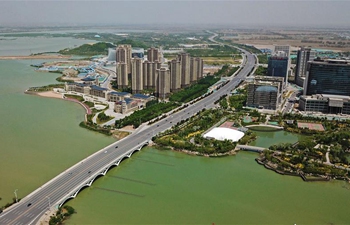NANJING, July 3 (Xinhua) -- After Wang Yu donated blood at a Red Cross blood center in Nanjing, capital of east China's Jiangsu Province, he was told he was eligible for an "honest and trustworthy citizen" card.
"I have been donating blood for many years before I moved to Nanjing several days ago. I just want to help people who need blood. I never thought that donating blood could be associated with personal trustworthiness," said Wang.
"But the relevance makes my donation more meaningful," the 33-year-old added.
The city started to link voluntary blood donation with citizen's trustworthiness in November 2016, along with other behaviors including acting bravely for a just case, taking part in charity activities or volunteering.
When citizens are found doing such things and meet the standards set by the city's development and reform commission, they can get a "trustworthy card," with which they can enjoy discounts with the city's public services.
"Citizens who own this card can enjoy many benefits. For example, they can get a 50 to 60 percent discount on bus or subway tickets," said Yang Shasha, a staff member of a state-holding company, which is in charge of issuing the cards.
Yang said the company has issued nearly 5,000 such cards since 2016. She said along with local residents, "more than 10 foreigners have been granted this card."
"Issuing this kind of card serves as an incentive. It's not only about honesty. With this card, we are promoting an environment of good faith, meanwhile, we wish to encourage more people to do good things, be good people and care about the society," said He Jun, deputy director of the commission.
Besides residents, enterprises can also benefit from the social credit system.
The commission said they have built a "credit image" for each enterprise using a credit database and big data. The image displays the credit scores of enterprises, as well as their business condition, development and social effects.
Wu Jianhui's company had a circulating capital problem due to relocating his factory.
"Since my company's credit standing has been rated level-A by the local tax department, a bank loaned us two million yuan (300,000 U.S. dollars) very quickly, that helped us overcome our financial problem," he said.
More than six billion yuan (902 million U.S. dollars) has been loaned to micro and small, and innovative enterprises from 2016 to May 2018, according to the commission.
China has been making efforts to build a social credit system to improve its business environment and boost development in recent years.
In January this year, 12 cities were selected as the first group of model cities implementing the social credit system, including Nanjing.
In the popular tourist city of Xiamen, east Fujian Province, a credit tourism management system has been set up to collect credit information of tourist agencies, star-rated hotels, tourist attractions and tour guides since 2017.
More than 74,000 pieces of tour guides' information and 6,700 pieces of information about tourism companies have been collected, which tourists can look up on the internet for reference.
In neighboring Zhejiang Province, the city of Yiwu, known as the "world supermarket" for its wholesale goods, has built a credit information sharing and publicizing platform last year. Credit information of government departments, financial institutions, enterprises and individuals has been collected for government governance.
"China's social credit system won't replace our legal system or moral principles. They complement each other," said Han Jiaping from Chinese Academy of International Trade and Economic Cooperation, Ministry of Commerce.
The State Council decided at an executive meeting chaired by Premier Li Keqiang last month that the country will roll out vigorous efforts to build a more comprehensive and rigorous social credit system.
"Breakthroughs have been made in developing the social credit system. Going forward, the system needs to be improved in key areas in response to specific needs," Li said.
Key priorities for improving the social credit system include building a social credit-centered regulatory mechanism and enhancing social credit building in key areas concerning people's livelihood.















